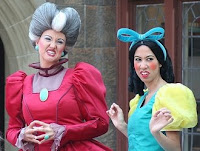 I admit some initial attraction to the idea of hiring domestic help when I first learned of the (practically legendary) cheapness of domestic labourers in Singapore. The Government calls them Foreign Domestic Workers (FDW) but everyone else calls them maids. And they are everywhere. If you want English-speaking, then Filipinos are recommended, otherwise Indonesians.
I admit some initial attraction to the idea of hiring domestic help when I first learned of the (practically legendary) cheapness of domestic labourers in Singapore. The Government calls them Foreign Domestic Workers (FDW) but everyone else calls them maids. And they are everywhere. If you want English-speaking, then Filipinos are recommended, otherwise Indonesians.
You see them on the street and in shops and restaurants in their uniform of T-shirt and oversize shorts, both washed to the point of grayness. It's defensive you see; better to avoid attracting attention of _any_ kind. It's the same tactic hostages are taught; Andy McNab talks about becoming the grey man in Bravo Two Zero. Any suggestion of sexuality risks comparison with the female employer or attracting unwanted attentions of the male employer.
I'm going to call it a plight, even though I know most welcome the opportunity to earn foreign currency to send back home. Many are married (or thereabouts), often they have their own kids. Standard contracts are for 2 years with no home leave, but some stay for decades; it really varies.
There are few absolute regulations involving where they sleep. They should have a space to themselves but it can be the windowless bomb-shelter (I'm not kidding) built into many condos.
Where possible, your FDW should be given a separate room of her own. In the event that one is unavailable in your home, you should respect your FDW's need for privacy and ensure that sufficient private space for sleep is provided.
They don't need a TV or radio as they will be up to cook breakfast for the kids are 5:30am and might still be washing up or ironing at 9pm.
The duties of a maid are to assist the household which means cooking, cleaning, washing, ironing, childcare, nannying and care of pets and the elderly. It excludes duties outside the home like cleaning the car (much flauted), caring for a non-household member (say, a neighbour) or supporting a business (baking cakes for a shop). You are not allowed to loan out or share a maid.
Which brings us to a contemporary issue of whether to give your maid any time off. Actually, more a long-standing issue as this BBC story from March 2006 shows. When I was in China/Hong Kong, the Filipino maids used to gather every Sunday at Causeway Bay on the island for a packed rice lunch and a chat with fellow natives. In Singapore, accredited agencies are supposed to create contracts with paid rest days included but you try enforcing it; a maid can go for 2 years without a day off. There is even a website to highlight the issue and a recent Government review concluded the status quo was reasonable:
most maids are happy working in Singapore and the reported cases of abuse have remained low. 'There is therefore no need at this point for MOM to legislate a mandatory rest day'
Officially, the Ministry encourages rest days:
A well-rested Foreign Domestic Worker (FDW) is more productive and better adjusted. Hence, you should ensure that your FDW has sufficient rest, especially during the night.
Sufficient rest days should also be catered for, as mutually agreed upon between yourself and your FDW. Such rest days should be in addition to any family trips and outings which you may take your FDW on.
That's all well and good but the word from taxi drivers is that Singaporeans are getting a bad reputation for maltreating maids and many are now learning Cantonese to seek work in Hong Kong where conditions are better. Singapore is therefore having to consider other sources of cheap and pliant female economic migrants such as Nepal to fill the strategic maid gap.
A steady supply of maids is important since the tax benefits for a working couple are considerable and the FDW policy underpins the Government's desire for the Dual-Income-Lots-of-Kids Singaporean family unit. The new worry is of a generation of kids brought up by untrained nannys, but the English aristocracy mostly survived this issue so I imagine Singapore will also.
